Making Space for Queer Futurity in Texas
Nicolas Shannon Savard: Hello and welcome to Gender Euphoria: The Podcast, a series produced for HowlRound Theatre Commons, a free and open platform for theatremakers worldwide. I'm your host, Nicolas Shannon Savard. My pronouns are them and theirs.
The audio you'll hear in today's episode is from a virtual pre-conference event hosted by the Association for Theatre in Higher Education's LGBTQ+ Focus Group, for which I am the 2023 conference planner. Each year, we host a panel featuring queer artists local to the conference's host city. Traditionally, it's been part of the conference itself, however this year we hoped to make it more accessible and open to guest artists' home communities by hosting it before the conference on Zoom and recording.
Our graduate student representative, Melissa Sturges, who you'll hear later, organized a panel with two Austin, Texas-based performance artists, Sam Mayer and p1nkstar. Sam Mayer is an Austin-based playwright and performer. He's doing super interesting experimental work, blurring the boundaries of public and private, virtual and real world, and audience and actor and creator. His latest project is called poolboy00, a live interactive reality show that started as a Twitch stream and has morphed into a durational live performance art installation. I'll include a link in the transcript. Highly recommend checking that out.
This episode is going to focus primarily on p1nkstar's projects, building and sustaining trans community through music and performance art in Texas. Her work aligned really perfectly with the making space theme of this season, and I am so excited she agreed to have her presentation turned into a podcast episode and that I get to share her work with all of you. So without any further ado, I'll turn things over to Melissa and p1nkstar.
Rebecca Kling: Gender euphoria is—
Dillon Yruegas: Bliss.
Siri Gurudev: Freedom to experience masculinity, femininity, and everything in between.
Azure D. Osborne-Lee: Getting to show up—
Siri: Without any other thought but my own pleasure.
Azure: As my full self.
Rebecca: Gender euphoria is opening the door to your body and being home.
Dillon: Unabashed bliss.
Joshua Bastian Cole: You can feel it. You can feel the relief—
Azure: Feel safe.
Joshua: And the sense of validation.
Azure: Celebrated.
Joshua: Or actualization.
Azure: Or sometimes it means—
Rebecca: Being confident in who you are.
Azure: But also to see yourself reflected back.
Rebecca: Or maybe not, but being excited to find out.
Melissa Lin Sturgess: My name is Melissa Sturges, and I use she, her pronouns, and I will be moderating, facilitating, but I'd love for this to be just an open conversation as well.
So, the Doric Wilson Panel is an annual event hosted by the LGBTQ Focus Group at ATHE [Association for Theatre in Higher Education], always highlighting the work of queer artists local to the host city. And this year we are quote unquote live from Austin right now. And we're thrilled to feature Sam Mayer and p1nkstar.
So just a little bit about where LGBTQ Focus Group at ATHE fits into Austin. Austin's identity as a city is so deeply rooted as a performance capital harboring DIY and emerging talents. Of course, due to systemic intense and rapid gentrification and historic erasure of LGBTQ communities, Latinx and Black communities, it has become increasingly untenable for many artists to maintain a thriving practice.
That being said, there is an incredible practice happening in Austin. There is an expressive, wonderful, beautiful practice happening in Austin. And we want to consider both the challenges and the celebrations behind that. And that's why we as a focus group are really committed to bringing practicing artists here. And one of the things we love about this panel is that many times at conferences in general, academic conferences in general, is that this kind of artificial divide happens.
So, what I would love for the conversation, if it goes there, if it doesn't that's okay, is to think about what we as scholars and educators and members of an academy can do to better support, better advocate for, and better bridge the gap between artists as well.
That was a lot of talk, that was a lot of words. And now I'm passing it on to… Okay, let me introduce you. p1nkstar creates a world far removed from this dimension's binaries through music and conceptual shows merging hyperpop with neoperreo and club. She has been described as “early aughts Paris Hilton on Hello Kitty steroids” by the Austin Chronicle, who crowned her as their pop princess in 2020.
Since 2016, p1nkstar has rapidly become an emblematic figure in the Texas art and nightlife scenes by opening inclusive spaces that center the work of trans and queer artists. p1nkstar is the first trans person to receive an Austin Music Award and has received three Best of Austin Awards for her space making work in the city. Most recently, she was featured on the cover of Austin Woman Magazine representing the future of Austin women in music. In 2022 she was featured on Billboard's Speaking Against Texas' Anti-Trans Initiatives and recorded a live session with NPR.
Previously p1nkstar has been on the cover of the Austin Chronicle, the Austin American Statesman, and Austin 360, and her music has been selected in Spotify's Fresh Finds Playlist. p1nkstar's work has been exhibited at the Contemporary Austin, the Blanton Museum of Art, the Visual Arts Center, Fusebox Festival, and the Roots and Culture Contemporary Arts Center in Chicago; and she has supported acts like Charli XCX, Crystal Waters, Pussy Riot, the Ladies of LCD Sound System, Alok V. Menon, Dorian Electra, and more. And I'm going to drop all of these links in the chat for everyone to peruse at their own time is because they're awesome. Are the links going to work? I hope they do.
p1nkstar: Oh, thank you. I guess I wanted to start with, just to contextualize p1nkstar as it is at the moment and the things that have happened achievement wise, and then go into more of the backend of p1nkstar and how it all originated.
I am trained as a performance artist, and I come from a fine arts academic or cultural research background. That's both of my undergrad degrees, what I did at UT [The University of Texas at Austin]. And I think as a performance artist, I have used the aesthetics of the pop icon to embed my work into the world. And I think when I started, I guess, yeah, things started when I was still a student at UT, an undergrad, and it was a way for me to renounce the institution of art, which in my eyes is not making significant change. And how, I don't know, I really liked the idea of making work that existed in the world and that interacted with the world to create positive change in our communities rather than talking about it and conceptualizing the experiences of marginalized people instead of actually making them better in the real world.
Because I think things started in a weird, weird, weird way, becoming a pop star made the most sense for me at the time. And I think partially I think of American pop culture, it's one of the most commercial forms of art that speaks to the most people. And also we see celebrity and we see pop musicians as they're the gods of our time in a way in American culture. And so it all made sense for me at the time. And I guess I'm going to go to... And these are the initial projects, things started as a social media performance. So very similarly as Sam, I was vibing with everything that you were saying, and things started as a persona that I was performing on Instagram and creating this transmedia narrative supplementing with video work that I was doing at the time. So I was making pilot episodes for a kids TV show and then just different things.
And I think the way that p1nkstar actually got embedded into the world is I made a music video that went viral in my hometown in Mexico because it was very controversial, because it was very gay and celebrating being a bottom essentially. And so I think that initial legwork got picked up by Co-Lab Projects. That's an art organization here in Austin. At the time they had a space in downtown Austin on Eighth and Congress, which is just probably half a block away from the Contemporary Museum of Art in Austin. And they gave me this window display. And we just started doing that branding of the persona of p1nkstar in the real world, and they also pushed me to do the performance in the world, in the gallery space, in life, in nightlife.
I'm slowly getting in the door, and I'm going to hold that door open for as many people behind me as I can.
And I mean, that really completely changed the project really quickly because I had to learn how to make music. I had to learn how to perform in the world. I had to... Yeah, I don't know, it's been really great for me, the reception of my work in Austin, because I went straight from showing at a really amazing space. This was my first exhibition ever in a group show in downtown Austin. From there got plugged into queer nightlife and then started getting bookings in nightlife. And that became the main stage of my work.
And I guess this kind of p1nkstar 1.0 stuff. This is some of my first shows.
Nicolas: I’m going to give some image descriptions of what we were seeing during the presentation so you all listening can appreciate the glorious queer popstar evolution as much as we did. Early p1nkstar 1.0 wears her curly brown hair in pigtails and ribbons. She wears a fluffy hot pink zip-up vest and a knee length white flared skirt. Girlish hyperfemininity is contrasted with a thick mustache. In the window display, p1nkstar’s image is printed on a glittery pink star that hangs above a pile of bright blue and green throw pillows and balloons. The display is lit from above with a soft pink light.
p1nkstar: These really weird videos. This was a celebrity YouTube video, like a gossip celebrity YouTube video in this weird alternate reality that's futuristic and queer-centric. And the host is some weird looking drag queen from the future, but they're talking like the latest news on p1nkstar. I don't know. We were creating this weird world that existed in conversation with the real world but also spoke to the future and what queer futurity could look like.
This is also a performance that we did. We hosted a meet and greet, and this was probably three months into creating p1nkstar. And I don't know, p1nkstar was always famous and p1nkstar was always big and p1nkstar was always, I mean, a star. And so the whole concept of this performance—it was several performative activations at this space in Austin. And I collaborated with an artist named Sasha Fishman to create the environment for it.
Nicolas: For her VIP lounge meet and greet, she arrives in the classic furry vest, a silvery metallic skirt, and matching knee-high platform heel boots. The space is a cozy lounge: velvety purple bench, pink shag throw rug, colorful lava lamp-esque design painted on the walls, all bathed in pink, purple, and blue light.
p1nkstar: But at the space we were having a party, and I invited a bunch of queer raver kids that I was very inspired by and were actually my friends, and we were just all served looks in nightlife in the underground, and then I just invited them to come and hang out. And I had a photo booth for people that were at the event. And there's these really funny pictures here, like me signing someone's body and this picture with this old white couple that was just there.
So I don't know, that felt really exciting at the time, just to blend this hyper-queer, hyper-futuristic world into, I don't know, into our reality, into what was happening, and how, in those spaces, how, I don't know, there was some friction that felt really interesting because these environments put queer people on a pedestal, on a higher ground or on the ground that felt more comfortable for us. And so, when people came into these spaces, especially cis white straight people, they felt really de-centered. Yeah, it was just, yeah, I don't know. It was good. It was fun.
And I think for a while p1nkstar straddled performance art and nightlife and music. And I think over the years, just because of the reception of my work, I have become way more of a musician, and I'm operating in the music world. I'm always in and out of the art world and also very involved in nightlife and community and party.
And so I think how I see my work now is both as a pop star—a pop musician—and also a community leader. And in this weird way, I have become a pioneer for trans artists in Texas and in the South. And I'm the first trans person to do a lot of things, which was really odd and weird and disgusting. Yeah. When I received the Austin Music Award I got last year, I felt very weird about it. I'm like, "It's 2022 and I'm the first trans person to receive an Austin Music Award in Austin." Okay, I'm grateful, but that's just off.
A lot of what I've been thinking about is how to create spaces for trans people to thrive.
And so I think just having that attention has made me realize how much we're lacking as a community and how me being able to get in the door… I'm slowly getting in the door, and I'm going to hold that door open for as many people behind me as I can. And so I think that's a very important part of my work and how I spend a lot of my time and my practice at the moment, especially in the political climate that we are in Texas this last year with anti-trans legislation essentially.
Nicolas: Going to pause for a minute. This deserves a little additional context. Brief overview of the state of trans affairs in Texas. I think it would be easy to write off the entire state as hostile to trans existence in so many ways—particularly politically and structurally right now, it absolutely is. Last year, Texas governor Greg Abbott made national headlines when he issued a directive to state health agencies to investigate parents of transgender children classifying gender-affirming medical care as child abuse.
The ACLU is currently tracking fifty-three anti-LGBTQ bills introduced in the 2023 legislative session in Texas alone. A total of five bills have been signed into law, specifically affecting trans folks access to healthcare, education, and sports participation. Trans, queer, and drag artists have also flagged Texas's SB 12, which criminalizes quote unquote “sexually oriented performances” in public spaces and commercial venues as a sixth anti-trans law because of the way that trans and queer folks tend to be inherently overly sexualized by our culture. At the same time in the capital city that is pumping out all of these political attacks, just blocks down the street, there is a thriving queer and trans performance scene and art scene.
p1nkstar: I think a lot of what I've been thinking about is how to create spaces for trans people to thrive and trans people to stay in Texas and be safe in Texas and for trans people to find community and to collaborate with each other and to support each other. I think for a while I've been doing work like this, and I'm going to share my screen again and just show some of the archive websites of some of the projects I've worked on over the years.
So, maybe Texas Pride Online first. And this was something that we did in the pandemic. It was a group of four different promoters in Austin that was the core group who conceptualized this project, and we collaborated with queer community leaders everywhere in Texas. I think there's five or six different cities. Oh, it's actually more: eight different cities in Texas. And we found community leaders that we knew in nightlife and performance to curate, to showcase this for each city. We had this huge four-hour program that was pretty well attended. And this was in 2020. It's right when the pandemic had hit. There was no Austin Pride that year. There was no way for us to celebrate and bring community together.
And I think for me and for many people that exist in nightlife or that operate in nightlife, that is the source of community and inspiration. I got extremely depressed during the pandemic just because I couldn't see other queer and trans people perform or just exist in the world and be celebrated. And so I think some of these projects are reacting to states of the world at the moment. So this was a way for us to celebrate queer community. And we, I mean, we had a whole four-hour program, DJ sets, drag performances, music performances.
Something that's really special about these digital projects is that this is a document of what was happening in Texas, in the queer world in Texas in 2020 for the rest... this will exist online as long as YouTube is online and even maybe if it becomes something else. This has become a way also to document for performance in Texas and what is important to us here in Texas.
And similarly, I think another iteration of that was Girls Like Us, which is, we called it a live music video experience, and it was in conjunction with my first EP release. So, I released an EP the day before, I guess, the United States declared there was a global pandemic and that it was actually real and that we had to be indoors. And so I hosted a big eve of release party before we even knew that the world was collapsing. And that was the last party too, the last big queer party in Austin before the pandemic. And so it was this really weird thing where I feel, especially that year, a lot of my peers and I were working towards South by Southwest and towards... Yeah, I mean, I think a lot of us had been booked officially for South by Southwest, and we were trying to push our work a little further and then invested thousands of dollars, invested thousands of hours working on this. And just the world shut down for two years. And that was also shattering, I think, for a lot of us.
And Girls Like Us was... And then another important part of that was, I had created a whole multimedia show that went along with my music, and I was only able to perform it once. And so Girls Like Us was a way to expand on that and to actually create a performance, a live music performance, of the work or of the music.
Nicolas: For a visual description: the p1nkstar who appears in Girls Like Us has shaved off the mustache. She’s got that classic mega popstar look, larger than life, surrounded by a pink glowing light center stage with her microphone. She wears her curls loose this time. A white faux fur jacket over a metallic leotard. Her background singers and dancers wear asymmetrical, form-fitted, metallic black and silver crop tops; skirts; leggings; leotards; thigh high boots; heels in a variety of combinations. Gender is irrelevant. They are all sharp and sleek, futuristic, endlessly cool.
p1nkstar: I mean, something that was really important for this project was to showcase trans artists in Texas, and especially the artists that I was working with were mostly making pop music in Texas talking about queer stuff. And so, I think, for us also the quality, the visual quality of whatever we created had to be very elevated because pop music can only exist if it's higher than reality, higher than... it's glamorized. And we wanted to create that, too, for all these artists that don't have the resources to do that kind of stuff in Texas.
And so it's like a gift to those artists, a gift to the people that were tuning in just to see these incredible performers. I don't know, this project really changed a lot for me and the way I think about my work and the way I think about being a pop star and also showcasing community and working community at the same time. It's just very much that it's like my career as a musician is important to me and achieving higher things as a musician are important to me only because that will give me access to more resources to help my community.
And so I think this is an iteration of that, too, where I had the opportunity to create this high quality, film quality live performance show, and I wanted to bring more people into it. In total, I think everyone that worked on this production was queer, based in Texas. We were thirty queer artists that made this happen, and it showcases trans women, mostly transfems. So it was very cool. It's a project that really showcases the way that I want to operate and the way I design community projects and the way... Everyone got paid, they paid thirty-plus artists, queer artists, in the middle of a pandemic. And it showcased, yeah, Ariel Zetina; Gavilán Rayna Russom; just Natalie Lepore, the mother of the House of Lepore; BabiBoi. These are all artists that are making incredible work everywhere and all trans. So I don't know, I do the kind of work that I think I'd be doing all the time.
And what was really cool about Girls Like Us, too, is that everyone in Texas got very excited for it. It was this weird thing where the NPR radio station of Austin was promoting the release of Girls Like Us without us even reaching out to them. And it was stressful because I was trying to finalize this project, and it was just everywhere because no one in Texas had done something like this in the pandemic at this level of quality. But not only that, it was showcasing a bunch of queer and trans talent.
And this project, I think, also solidified me as an artist in the eyes of the Austin music scene as a musician and not a performer. I think that there was also some friction that I was traveling for a while where musicians or the Austin music scene saw me not as a musician, but as a performer, because of the hyper queer aesthetics of my work.
And I think after this, after receiving the Austin Music Award, that had to be dissolved. And I think to me that's also important because there's so many artists that are creating work similar to mine in Austin that now are actually being perceived as musicians in the Austin music scene.
I guess, this is another community project that I work on now is Serving Face, and this is the fundraising series. It's a party and a fundraising marathon for trans people who are seeking gender-affirming surgeries. And we just throw this big party at Cheer Up Charlies and raise thousands of dollars. And it's a lot of the queer community, queer drag artists, DJs coming together on stage to support just our siblings, our trans siblings, to get the care that they need. Yeah, it's really fun. I'm excited because it's coming back September thirtieth.
I think these projects, specifically creating more institutionalized spaces for community, for trans community in the South and in Texas and in Austin, are becoming really, really important for everyone in the trans community.
But yeah, these kinds of projects, these community projects, I think are very exciting to me. Sometimes even more so than my own music. But I think to me, using the stardom and the coolness of being a pop star to make work that's actually community centric. And I mean, I don't know, yeah. I've been telling people recently, I'm a one-person nonprofit, and it's weird because I'm not a nonprofit and I don't want to be, but I see gaps in my community and I know that I'm able to make a positive change, so I just have to do it and I have to do the work.
And then, I guess, into the future of the works that I want to be doing, I'm looking into opening an art space focusing on the work that transgender and gender-nonconforming artists in Texas are making and trying to find significant institutional funding from national art institutions to pay for that or city grants with tax money from bigots in Texas to pay for me to open an institution that supports trans art. It's something that is very in the works and very trying to find a way to get that started financially. And also to open a trans school of music and art in Austin. So I think those are the two projects I'm looking forward to. And hopefully that happens within the next two years.
I think these projects, specifically creating more institutionalized spaces for community, for trans community in the South and in Texas and in Austin, are becoming really, really important for everyone in the trans community. Because we are actively getting displaced, and it's becoming more unsafe to live in Texas. I see a big need for spaces that support artists like us and people like us, and that create jobs for people like us and that allow for us to exchange just skills and knowledge with each other.
I think this is all of it. It's scrambled. But I mean, that's also the nature of my work where it's like I am DJing one night, I'm doing a conference the next night, and I'm also working on just community work every day. So I like to try a lot of different things and I like to get my hands dirty and I like to be able to operate within the world. I think studying art made me hate the art institution. And studying queer performance studies made me understand that drag at a gay dive bar in the middle of nowhere in the US is as important as a performance piece at the Museum of Modern Art. And I think something that's really special, I think, about queer performance scholars is that they understand that these two different types of performance are equals and they're just operating in different contexts.
I think especially, too, coming from Mexico, seeing the different types of performance that exists here that don't operate in this European value system of art, it's being able to understand that all these forms go hand in hand with each other and are creating the same kind of impact. I think that also is reflected with the way I have a creative practice and building all these things, they all go hand in hand building for trans people. I think that's all I have for y'all.
Nicolas: Thanks so much to Melissa for coordinating this event and to p1nkstar for letting us share your work with the Gender Euphoria: The Podcast audience. You can check out more of p1nkstar's work on YouTube, Facebook, Instagram, Spotify, or at p1nkstar.com.
This has been Gender Euphoria: The Podcast, hosted and edited by me, Nicolas Shannon Savard. The voices you heard in the intro poem were Rebecca Kling, Dillon Yruegas, Siri Gurudev, Azure D. Osborne-Lee, and Joshua Bastian Cole. The show art was designed by Yaşam Gülseven.
This podcast is produced as a contribution to HowlRound Theatre Commons. You can find more episodes of this series and other HowlRound podcasts in our feed on iTunes, Google Podcasts, Spotify, and wherever you find your podcasts. Be sure to search “HowlRound Theatre Commons podcasts” and subscribe to receive new episodes.
If you loved this podcast, post a rating and write a review on those platforms. This helps other people find us. You can also find a transcript for this episode along with a lot of other progressive and disruptive content on HowlRound.com. Have an idea for an exciting podcast, essay, or TV event that the theatre community needs to hear? Visit howlround.com and submit your ideas to the Commons.

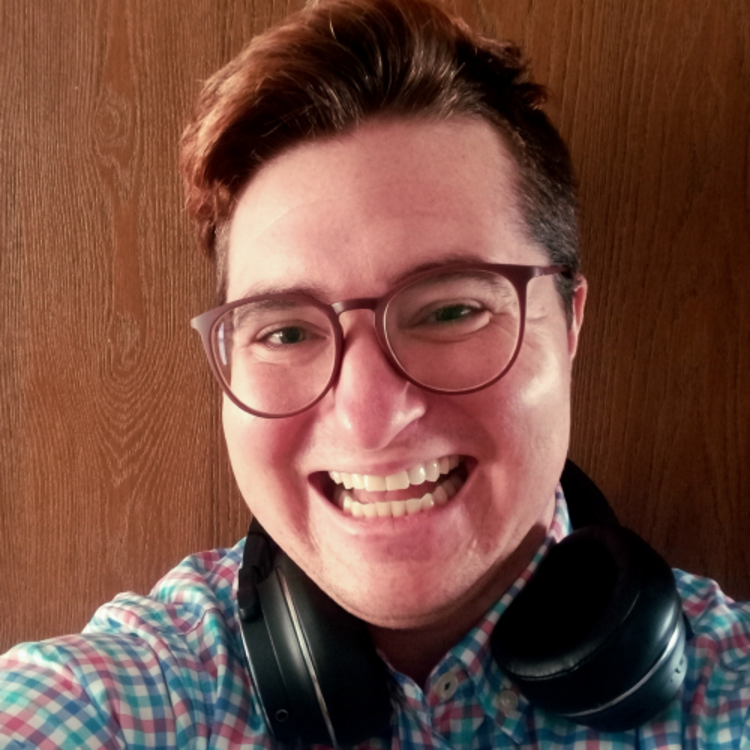
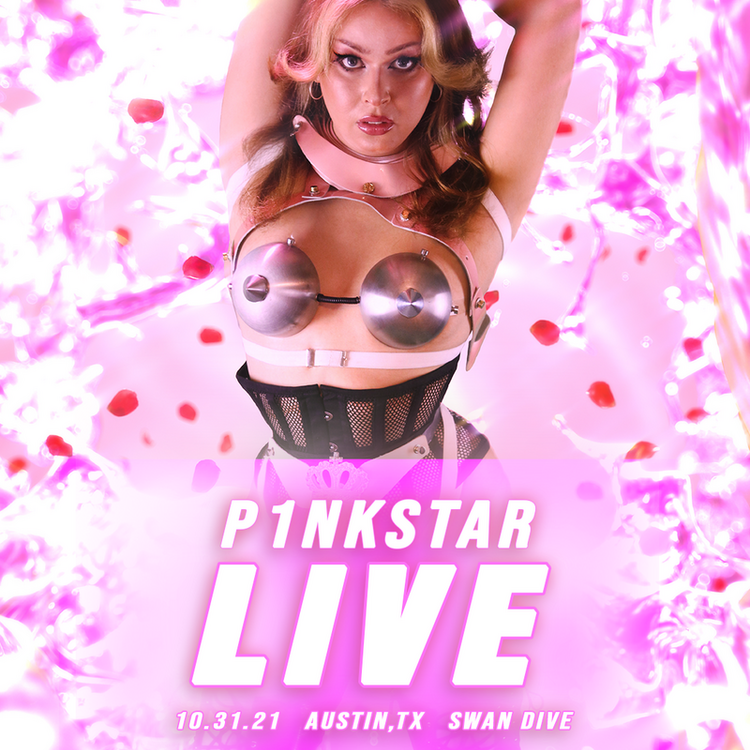
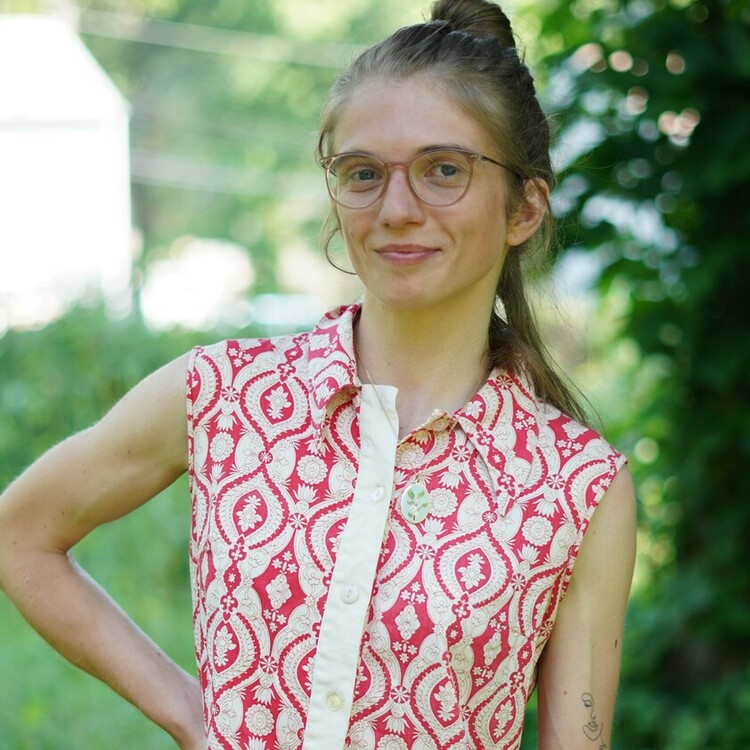
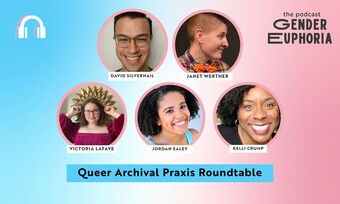






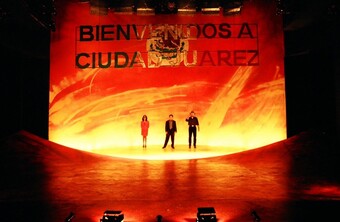



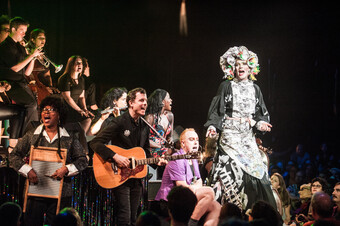

Comments
The article is just the start of the conversation—we want to know what you think about this subject, too! HowlRound is a space for knowledge-sharing, and we welcome spirited, thoughtful, and on-topic dialogue. Find our full comments policy here